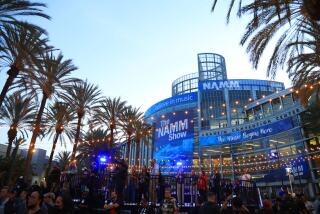CHANGING MUSIC MARKET SHOWN AT CONVENTION
- Share via
Willie Berg says it was legendary trumpeter Harry James who put the Berg family of Chicago into the mute business.
“I had a music store and Harry came in one day in 1938 and said somebody’s got to make a mute that’s in tune,” said Willie, 71, of his start at making the cone-shaped devices used by brass players to cover the openings of their horns.
Willie told the story with a touch of sadness Friday at the Anaheim Convention Center as he stood amid piles of the black instrument bags that his company, Humes & Berg Co. Inc., is pushing in this age when computerized keyboards can mimic the sound of a muted trumpet. Holding up a flight bag for an electronic keyboard, Willie’s son, Irwin, said, “We can’t beat ‘em, so we bag ‘em.”
The occasion was the 18th Winter Market convention of the National Assn. of Music Merchants (NAMM) this past weekend.
The Bergs joined over 500 of the nation’s makers and distributors of music-related products who were showing off their efforts to keep up with changing times. Dominant themes in the industry continue to be the popularity of increasingly affordable high-tech musical devices, the still-growing influx of imported instruments and the impact of cuts in public school music programs.
But association officials say the latest available statistics show that the industry continues to grow. Retail sales of musical instruments and related products totaled $2.7 billion in the United States in 1985, an 8% increase over 1984, according to the American Music Conference, another trade association.
“Overall, we’re doing well,” said Alfredo Flores Jr., outgoing president of NAMM. “But we have to think about the future, and the future is in education, in the kids who want to play instruments. The industry has to help give the kids an opportunity.”
Flores, with four music stores in San Antonio, Tex., said his business has been hurt by state legislation barring students from taking part in extracurricular activities unless they keep up their grades. He said the music industry and advocates of sports programs are joining forces to oppose the so-called “pass-to-play” laws around the country. (California has had such a law since July, 1986.)
But the convention, which drew more than 30,000 visitors to the cavernous convention hall, had its lighter side.
In the evenings, exhibitors sponsored concerts, including one by keyboard player Chick Corea. And by day, one could not forget that the products on display were tools for self-expression. Musicians, invited by manufacturers or dealers, wandered the floor, including a graying cocktail pianist testing the standard “Misty” on an amplified keyboard and an ex-member of rock group Twisted Sister demonstrating a drum set.
U.S. Army Sgt. Charles Ross and two officers from the military’s school of music in Norfolk, Va., were there. They smiled when asked whether they were looking for high-tech musical technology to accompany the Star Wars space defense system.
“No, we still have a focus on the old-fashioned marching band,” answered Ross.
Max Maxwell came to the show from Louisville, Ky., his blond hair sculpted into a mass of curves and lines that rose high over his head. In Anaheim to search for equipment for his father’s music store, the 22-year-old is also the drummer with an aspiring rock band.
“In the music business, this show is a hot place to be,” he said of the trade convention. “You get to see the merchandise . . . you meet a lot of people, you see rock stars, and it’s a lot of fun.”
More to Read
The biggest entertainment stories
Get our big stories about Hollywood, film, television, music, arts, culture and more right in your inbox as soon as they publish.
You may occasionally receive promotional content from the Los Angeles Times.









